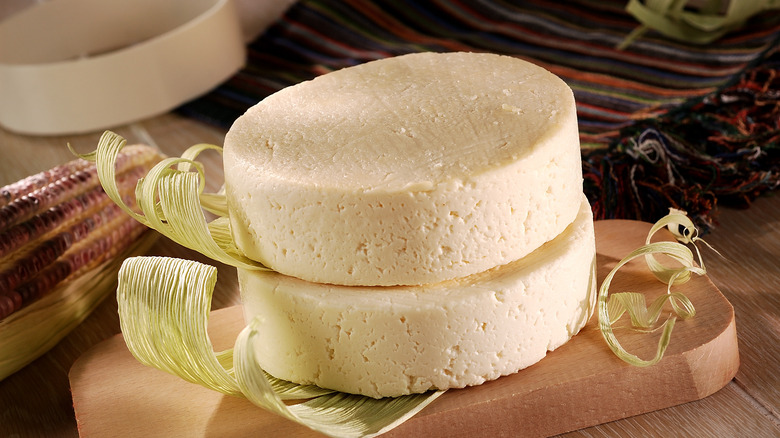How The US Border Unveiled A Huge Cheese Smuggling Scheme
We know that cheese is an item that is craved by turophiles and other curd connoisseurs, but many of us probably didn't know that cheese is a CRAVED item; that is, Concealable, Removable, Available, Valuable, Enjoyable, and Disposable, per Esquire. That's probably what one woman had in mind when she decided to try and bring 100 pounds of undeclared cheese from Mexico into the United States via El Paso.
The woman was spotted after she had tried to declare just ten wheels of cheese to the officer in charge before he discovered wheels hiding under blankets, and a few more wheels hiding in the trunk. Each wheel was said to weigh about a kilo, or 2.2 pounds, which made the entire stash just over 220 pounds in total, per the U.S. Customs and Border Patrol website.
While the law is very strict about importing dairy, Customs and Border Patrol (CBP) Officers are pretty lenient about bringing in the fermented delight in quantities "commensurate with personal consumption levels," CBP El Paso Port Director Ray Provencio says. "A few wheels would generally be fine but not 60. It was undeclared and that amount would be a commercial quantity and additional reporting requirements would apply."
Customs officials have seen other unusual food imports
The punishment was commensurate with the crime: a $1,000 fine and the confiscation and destruction of what was described as "contraband cheese." But a shipment containing a hundred wheels of cheese isn't even the weirdest food-related shipment that Customs and Border Patrol Officials have seen at the border. Per Bon Appétit, that list would include deer antlers and genitalia; dried sea horses and lizards; and donkey dung tablets.
But not everything customs officers catch and confiscate on the border is strange and exotic. The federal agency says its agents have seized more than 3/4 of a million pounds of banned animal products, made with pork, chicken, beef, and duck between 2021 and March of 2022, per U.S. Customs and Border Protection.
And there's a reason for this. Some cheeses can become tainted with salmonella or listeria, per STAT. Plus, as News Medical points out, travel has become one of the leading ways through which diseases are spread, and it falls on both Customs and the Department of Agriculture to ensure no germs that cause animal diseases like Highly Pathogenic Avian Influenza make it into the U.S. by hitching a ride on meat products (via U.S. Customs and Border Protection).

